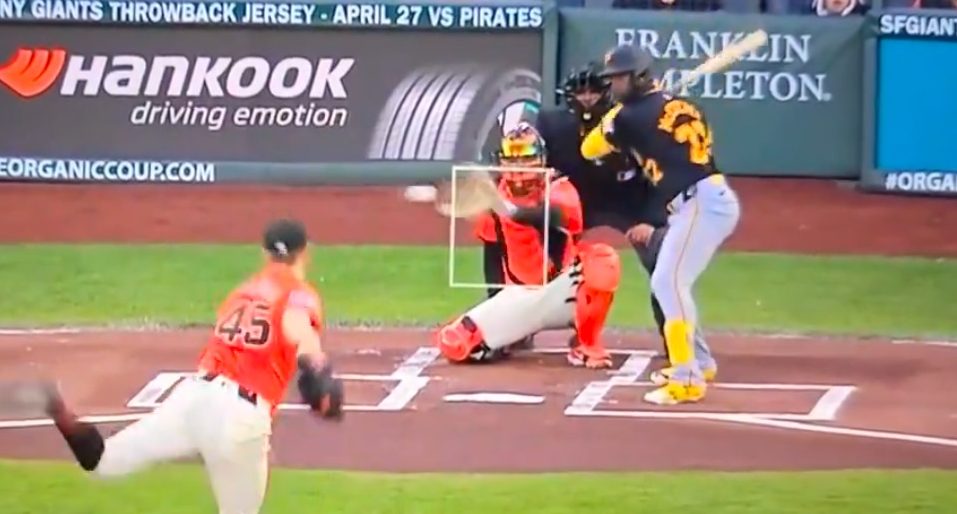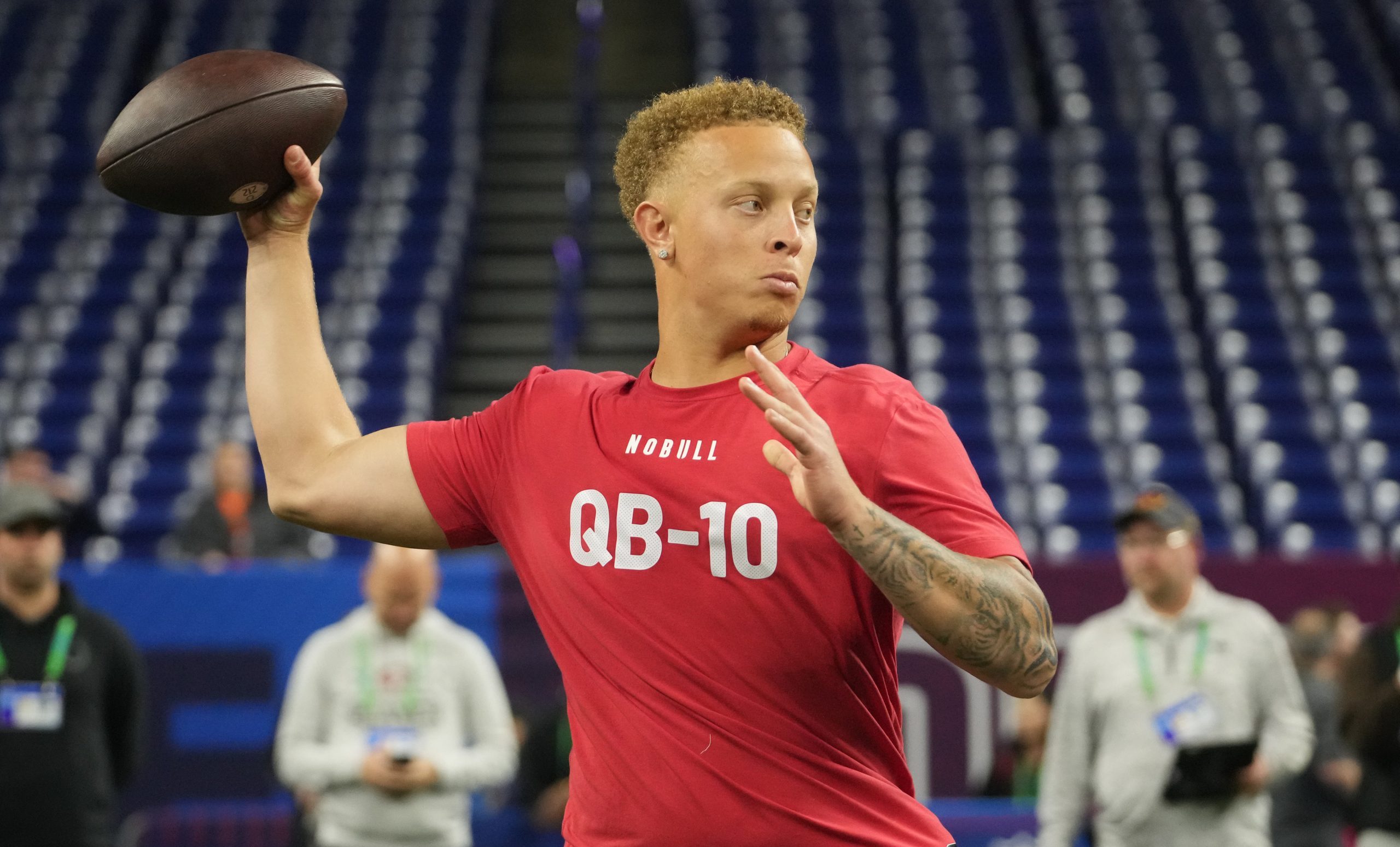We’ve seen plenty of NBA fans, players and executives complaining that their team doesn’t get more national television exposure, including Washington Wizards star John Wall in 2016. The latest comes from Toronto Raptors president Masai Ujiri. Ujiri went on Prime Time Sports on Toronto radio station Sportsnet The Fan 590 Wednesday, and he decided to complain about his team not being featured more on U.S. national TV broadcasts:
“It doesn’t bother me in person, it bothers me for our fans, for our organization, for our players,” he said.
“We don’t play as many of the so-called ESPN games, why is that? We’ve had one of the best records the last five years in the league so I don’t understand why the NBA does not give us, I think it’s a bunch of BS if you ask me, that they don’t give us more games.”
…“Honestly, if you haven’t won an NBA Championship you are not in the same category as Cleveland and Golden State,” said Ujiri. “But otherwise, I think we compete well with the other teams and they haven’t done anything to surpass us, we think. We feel strongly about that one, we are not scared of anybody. All the other teams that they are putting ahead of us, do I respect it? Yeah, it’s everybody else’s opinion but we are here to compete.”
…“I could really care less about what all these people say and the whole ‘disrespect’ thing. I feel for our players, I feel for our organization. What do we need to do? We need to win a championship. That’s what we need to do and hopefully we can continue to build and grow and get to that level because all these other teams built and they grew and they got to that level too,” said Ujiri.
“I think it’s a bunch of BS that we don’t play on as many national so-called TV games as we should.”
Well, “as we should” is an interesting point to debate. For starters, the Raptors are scheduled to play in five national TV games this year, four on ESPN and one on TNT. That’s at the lower end of the NBA, but it is tied with the Miami Heat and ahead of 10 other teams: Detroit, Phoenix, Sacramento, Memphis, Charlotte, Chicago, Indiana, Atlanta, Brooklyn and Orlando.
Yes, if performance was the only metric considered in picking national TV games, the Raptors would be higher; their last four seasons have seen them win 48, 49, 56 and 51 regular-season games. This season, they’re 28-11 and second in the East heading into Thursday night’s game against Cleveland (interestingly enough, a game televised on TNT), and they’ve been a playoff team the last four years (with first-round exits in 2014 and 2015, a conference finals loss in 2016, and a second-round exit in 2017). That would unquestionably put them ahead of teams like the New York Knicks (eight national appearances this year), the Philadelphia 76ers (14), and the Los Angeles Lakers (23).
MLS team Toronto FC faces a similar scenario. The team had been in back-to-back MLS Cups, winning last year and is on the verge of a potential dynasty but is only on U.S. national TV four times this upcoming MLS season. Performance isn’t the only metric considered, and it shouldn’t be.
From the standpoint of maximizing a TV audience (which is a network’s primary goal when considering what games to air), there are good reasons to not regularly select the Raptors for U.S. national TV broadcasts. One is that the vast majority of their fans live in Canada and will not count towards U.S. TV ratings. The NBA’s national games (not counting NBA TV broadcasts, which are national, but not in the massive audience sense) air on ESPN, TNT and ABC; the first two channels are not available in Canada.
And while cross-border ABC stations can be seen in much of the country, the practice of simultaneous substitution (showing a Canadian broadcast with Canadian ads to Canadian viewers even on a U.S. channel) would presumably block Canadian viewers from watching any ABC telecast. Even if it didn’t, they would not be monitored by U.S. ratings agency Nielsen and would not count towards U.S. ratings. (That’s a moot point in this case, as we’re talking only about ESPN and TNT broadcasts this year, but it’s something to keep in mind.)
Instead, Canadian viewers will be watching the game on the Canadian broadcast, which in this case is on Sportsnet One. It should be noted that every single Raptors game is carried nationally in Canada. Sometimes, games are on channels that aren’t in every package or offered by every provider, but the channels that air Raptors games are available to most Canadians who elect to pay for a higher cable package.
So, Canadian fans don’t count towards the ratings of ESPN, TNT or any other national broadcast. Now, those networks would still benefit from Raptors fans who live in or are visiting the U.S., and there are some of those, from Canadians who have moved to the U.S. to those who spend winters in the U.S. to Americans who like the Raptors’ team and/or some of their players. But it seems reasonable to presume that’s a smaller number than fans of almost any U.S. team.
And while local audience arguably matters less in the NBA than in most other sports (it’s often critical in the NFL, NHL, MLB and more), a league where successful smaller-market teams like the San Antonio Spurs and Oklahoma City Thunder regularly draw large audiences, the 31st and 62nd media markets are still better for broadcasters than the 0thers. Tons of fans from those markets tune in, often drawing local ratings four to five times that of the national average. It should also be noted that San Antonio in particular has a significant national fanbase at this point, arguably bigger than the Raptors’ U.S. fanbase.
Of course, compelling games also draw, and that has to be balanced. That’s why you’ll see the Raptors often selected when they’re playing a team that draws well, such as the Cavaliers. That gives TNT a Cavaliers game that has at least a chance of not being a blowout, and that’s probably better for them than, say, Cavaliers-Hawks (Atlanta’s currently last in the East with a 11-30 record) despite the absence of a local market. And as long as the Raptors continue to play well, they’ll be selected for some of those games; as mentioned above, they were picked for national TV more than 10 U.S.-based teams this season. But Ujiri isn’t happy with that, and it’s understandable why he wants his team to get more U.S. attention.
Toronto FC can use the star power of USMNT stars Michael Bradley and Jozy Altidore as well as Sebastian Giovinco to bring in a bit of interest among neutral MLS fans but they fall into the same issue with the Raptors in that their games register one home market in U.S. ratings and that’s why they have four games whereas the top teams have between 11 and 13.
The latest
- Could NFL see next Saudi sportswashing controversy?
- ESPN and NBA have reportedly ‘essentially come to terms’ on deal that would keep Finals on ABC
- G/O Media sells The Onion to ‘Global Tetrahedron,’ ex-NBC reporter Ben Collins to serve as CEO
- Eli Gold on Alabama exit: ‘You can’t argue with city hall.’
The degree to which national television appearances create competitive imbalance can be debated. There are plenty of factors that can cause competitive imbalance in the NBA, and the level to which TV appearances fit in there is far from proven. But even if it’s assumed that the present division of national appearances does actually create a significant level of imbalance, the question then becomes who should address it, and how. It seems difficult to assign that responsibility to the broadcasters, as their goal isn’t to be fair to all teams, but rather to televise what will make them the most money.
It may be more logical to put that on the league, which presumably at least has some interest in the health of all of its teams. But if the league forced broadcasters to provide increased appearances for certain teams that drew poorly, that would probably lower the value of its TV rights, so it might not actually be in its interest to do that. (This is presumably a moot point for the foreseeable future, as the NBA’s current contracts run through 2024-25.) And moreover, it’s worth noting that the so-called “superteam” era of focusing on a few star-studded teams has actually been doing quite well for broadcast partners. So full parity isn’t necessarily in the interest of the league or its broadcasters, and that limits the impact of any comments like Ujiri’s.
Of course, Ujiri can say whatever he wants, and complaining about a lack of national TV broadcasts did lead to more for John Wall and the Wizards. (Well, they wound up getting more national TV broadcasts in subsequent years; that may have been about them playing better and drawing better than they had been, or it may be about the complaints, or both.) Maybe it will work out for him too. And the “ESPN is unfair to us” narrative certainly will sell well with Raptors fans, many of whom have been pushing that argument for a while. But those games are available nationally in Canada regardless, so they’re not the ones who won’t be able to watch, and the five national games they do have this year are significantly ahead of many teams with more U.S. viewers.
Could there be more Raptors games shown nationally in the U.S.? Sure, and Ujiri and Raptors’ fans would undoubtedly like that, as it might even help them retain players or draw new players in free agency. But it’s hard to argue that U.S. broadcasters have compelling reasons to show the Raptors more of their own accord (“fairness” is not really an argument to apply to broadcasters’ game selection) at the moment, and while the league could try and force them to air more Raptors’ games, that would be difficult in the middle of a contract and perhaps not really worth it.
And there is potential for the Raptors to increase the number of U.S. national TV games they receive, but that has to do with their on-court performance; if they make or win a Finals, they’ll probably show up on U.S. national TV more. So this rant is a lot of venting from Ujiri, and that’s understandable, but it’s hard to see it changing much in the way of national TV selection. On-court results seem likely to play a bigger role there.
Update: this piece initially referred to Ujiri as the Raptors’ GM. He was initially the president and GM, but they promoted Jeff Weltman to GM when they gave Ujiri an extension as president in September 2016.







